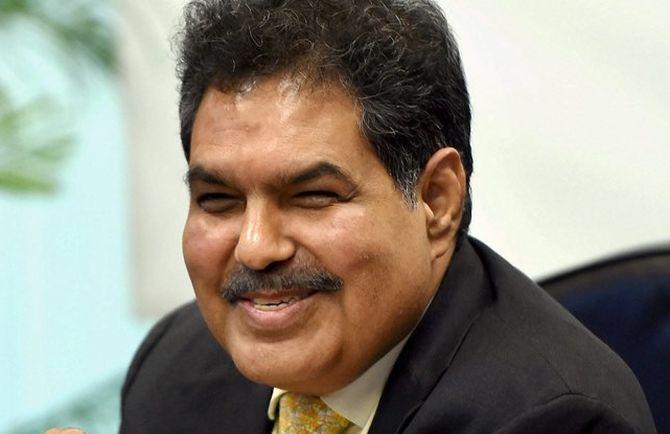'They have helped stabilise our market by acting as a counterbalance to foreign funds.'

Ajay Tyagi's four-year-and-nine-month stint as chairman of market watchdog Securities and Exchange Board of India has been largely successful.
He helped the market ecosystem ride through the pandemic, oversaw record IPO mobilisation, brought technology advancement for crackdown on insider trading, and introduced a new risk-mitigation framework to protect millions of new investors entering the markets.
In an exclusive interview with Samie Modak/Business Standard, Tyagi shares his views on various issues concerning the markets.
The second of a multi-part interview:
The deadline for separation of the chairman and MD post (of companies) is approaching. Will there be another extension?
Regulations on the subject were firmed up after considering an expert committee report and after due consultations and deliberations.
Adequate time has already been given to the companies covered under this regulation.
We urge them to comply before the deadline.
The mutual fund industry says Sebi has done excessive regulatory tightening?
Mutual funds are a very good story. We want to nurture it.
Among other things, they have helped stabilise our market by acting as a counterbalance to foreign funds.
The steps that we have taken will help the industry over the medium to long term.
Today, the industry handles Rs 37 trillion of assets.
Around 40 per cent are into open-ended debt funds where unit-holders could seek redemption (any time).
However, the securities they are holding include corporate bonds.
The market for corporate bonds in India has a problem of illiquidity.
The MF business is all about trust and faith.
To feel that any regulation aimed at investor protection is bad for the industry is not correct.
Sebi has also made the broking industry pop a lot of bitter pills...
Some of the regulatory changes that we have done are in the areas of share pledging, margin norms, and segregation of client collateral.
All the new rules are logical.
I don't see how anyone can complain.
They have made the system more robust; chances of people getting cheated have reduced and volumes have improved.
Would you like to give us an update on the NSE's IPO?
I will not comment on case-specific issues.

There is some criticism over how Sebi uses social media to establish insider trading...
We have started using a lot of technological tools, such as big data, artificial intelligence, and machine learning.
Our ambition is to use them more. As the market develops, unethical people will use all types of different tricks, and as regulators, we have to stay one step ahead.
When it comes to insider trading, the critical part is establishing a link between the tipper and the tippee.
You come across cases where someone, who has never traded in the past, suddenly gets lucky and starts making a lot of money.
Our surveillance department analyses such behaviour.
We then try to find links. For that, we may also make use of social media platforms.
I think there is nothing wrong with analysing or depending on that.
In insider trading cases, it will never be that someone will give in writing to the other party that this is the information, let's use it.
Is this a big menace?
I don't know to what extent but let me say among all the violations, we treat insider trading as the most serious one.
It goes against the very basics of trust in the securities market.
With all these millions of new investors entering the market, this trust of investors needs to be maintained.
Feature Presentation: Aslam Hunani/Rediff.com












 © 2025
© 2025